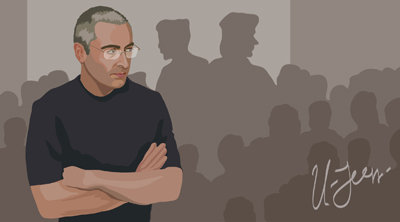Vladimir Novikov, RAPSI
Khodorkovsky’s pardon would almost certainly make him the winner only if he rejected it immediately and publicly. The certainty is qualified by an “almost” because then he would win many scores as a public figure, but would disillusion some as a simple man of flesh and blood. Less than a day after a shocking statement made by Russian President Vladimir Putin, the former oligarch has left his cell. The pardon was like a lightening bolt.
To begin with, let’s separate the socio-political wheat from the legal chaff. It does not matter when the jailed tycoon signed the petition for a pardon, and don’t believe what his numerous lawyers have said about being surprised, almost shocked, upon hearing the news. In fact, they have already disavowed their statements.
There might be a very simple explanation. His lawyers live in Moscow and Khodorkovsky was serving his prison sentence in Karelia near the Finnish border. The only other people who were geographically close to him, apart from his cellmates, were the prison guards. To appeal for clemency, he only needed a piece of paper, a pen and at least rudimentary knowledge of the Constitution, which Khodorkovsky definitely has.
As to whether an admission of guilt is a necessary element in appealing for a pardon, this is a purely theoretical issue. According to the Constitution, the head of state has the power to pardon anyone, with or without a signed petition. The signing of the petition is only part of the procedure and the last page in a case file that will end up in the archives.
The important thing is that the consequences of Khodorkovsky’s release will primarily only affect Khodorkovsky himself.
So, what will the ex-head of YUKOS - once Russia’s largest oil company - stand to gain? First, he will be able to be with his ill mother for the first time in 10 years.
He may be able to take up philanthropic work, to a degree. Spending time behind closed doors is only pleasant when they are the doors to your own home. Khodorkovsky doesn’t plan to become a politician, as he himself has said more than once, and we know that he is a man of his word. For example, he returned to Russia shortly before his arrest in 2003 even though he had been forewarned.
This is where the advantages end for Khodorkovsky the family man, and where the disadvantages begin for Khodorkovsky the opinion shaper.
Khodorkovsky is free, but Platon Lebedev, his closest associate, is not. Lebedev has no ill mother with whom he needs to spend time, and so he will not request a pardon, according to a statement released by his lawyers on Thursday.
As for Khodorkovsky’s other partners, Alexei Pichugin is in a maximum security prison, and Leonid Nevzlin has long since fled Russia and is living abroad. What will they think about their former boss’s decision? Maybe they themselves don’t even know.
But we know what common people, who felt sorry for the former tycoon only yesterday, think. He has lost his nerve. He could no longer cope with the situation and so he gave up, what with his mother ill and so on. After all, not everyone can be a Nelson Mandela.
Will he suffer from biting criticism or unkind sideways glances? I don’t think so. But the aftertaste will definitely be unpleasant.
In addition, his release will not affect the many unpleasant problems which have plagued the Russian business world for years. We should simply forget about them, at least for the next three months. Forget about growing capital flight, the revolutionary reshuffle of the banking market, and the fact that the period of liberalization of criminal legislation launched by Dmitry Medvedev is over.
In fact, the only benefit from Mikhail Khodorkovsky’s release will be a few months of illusion, about which someone will be able to shoot a thrilling TV movie 50 years from now.



